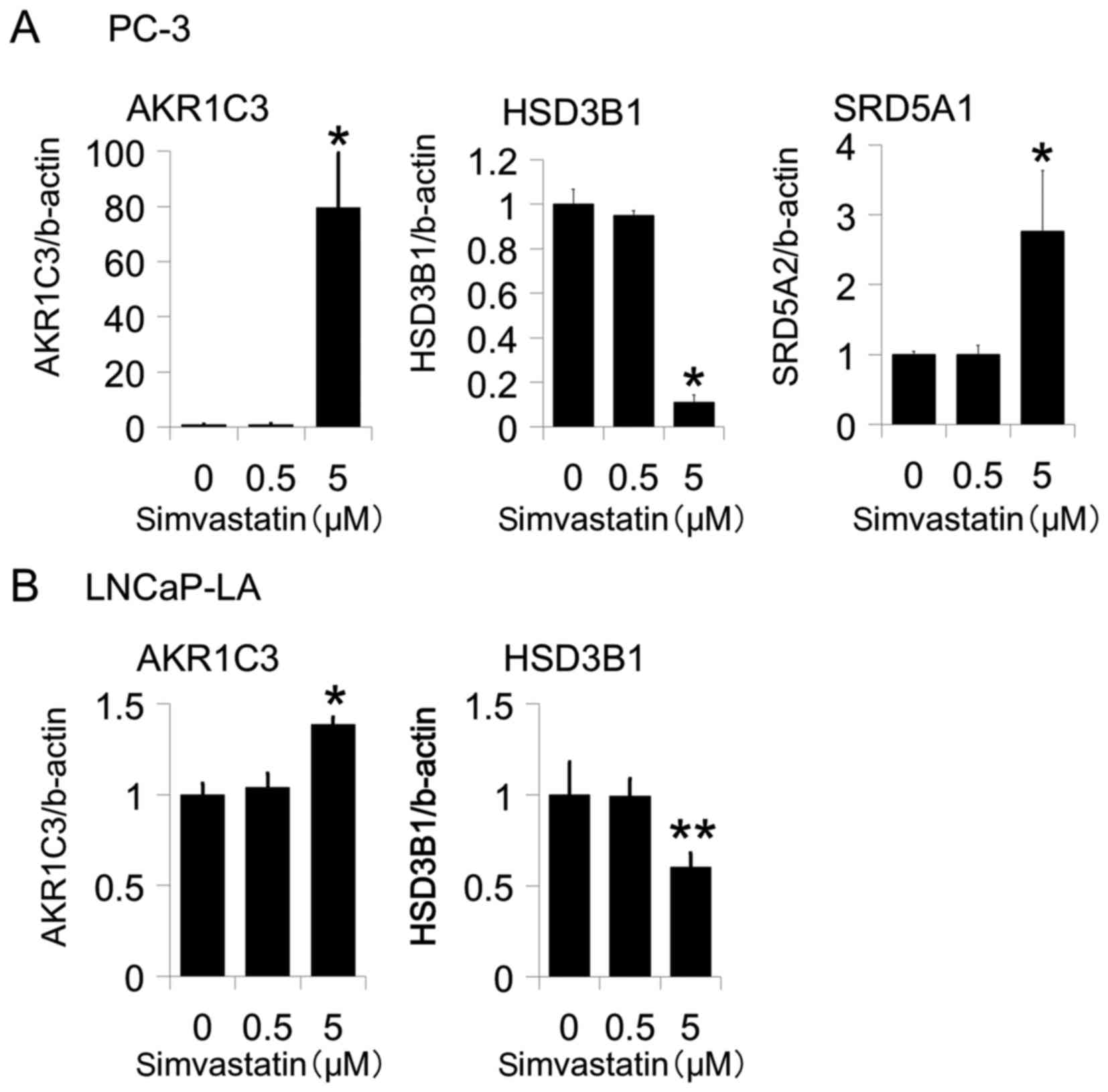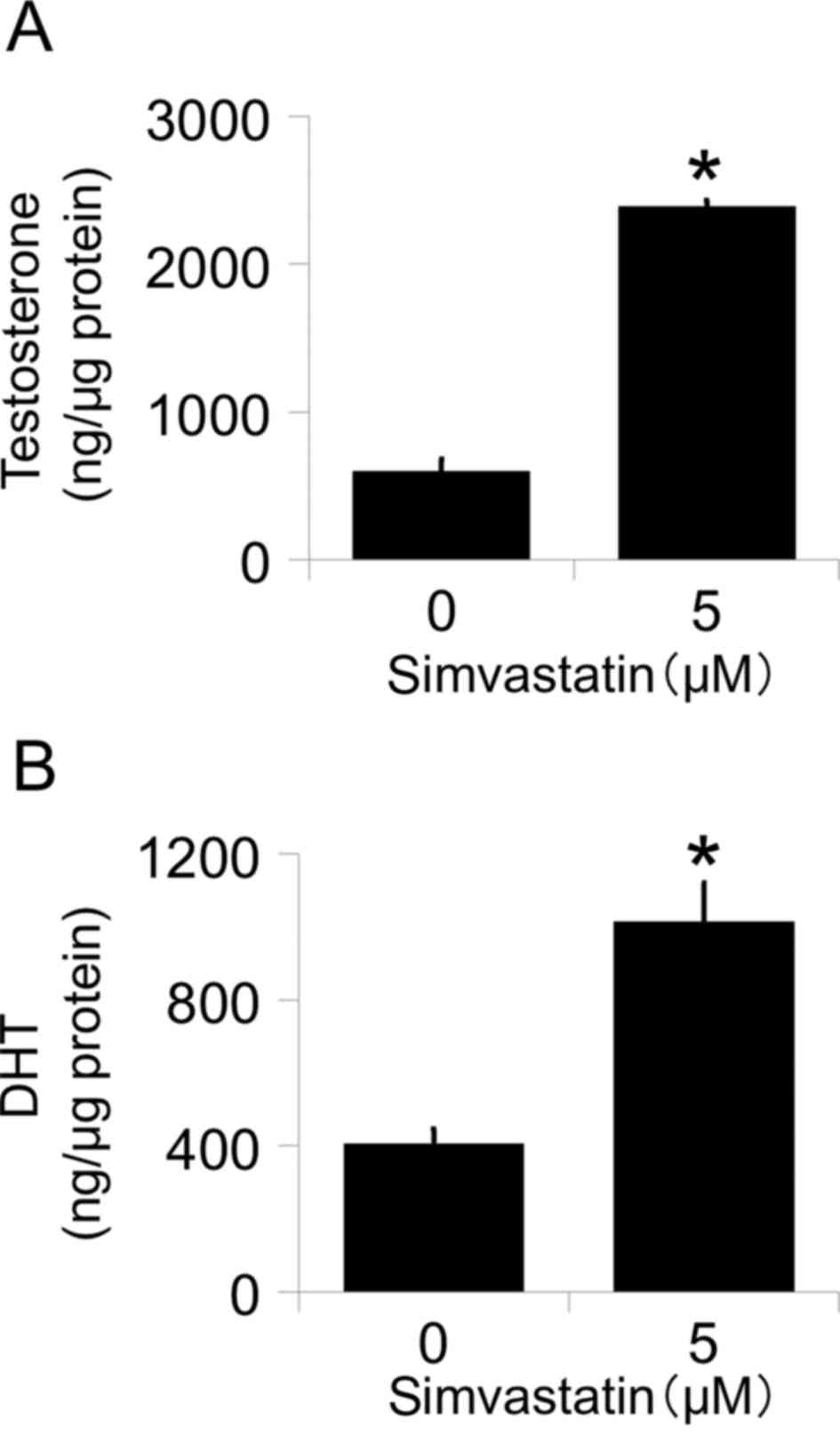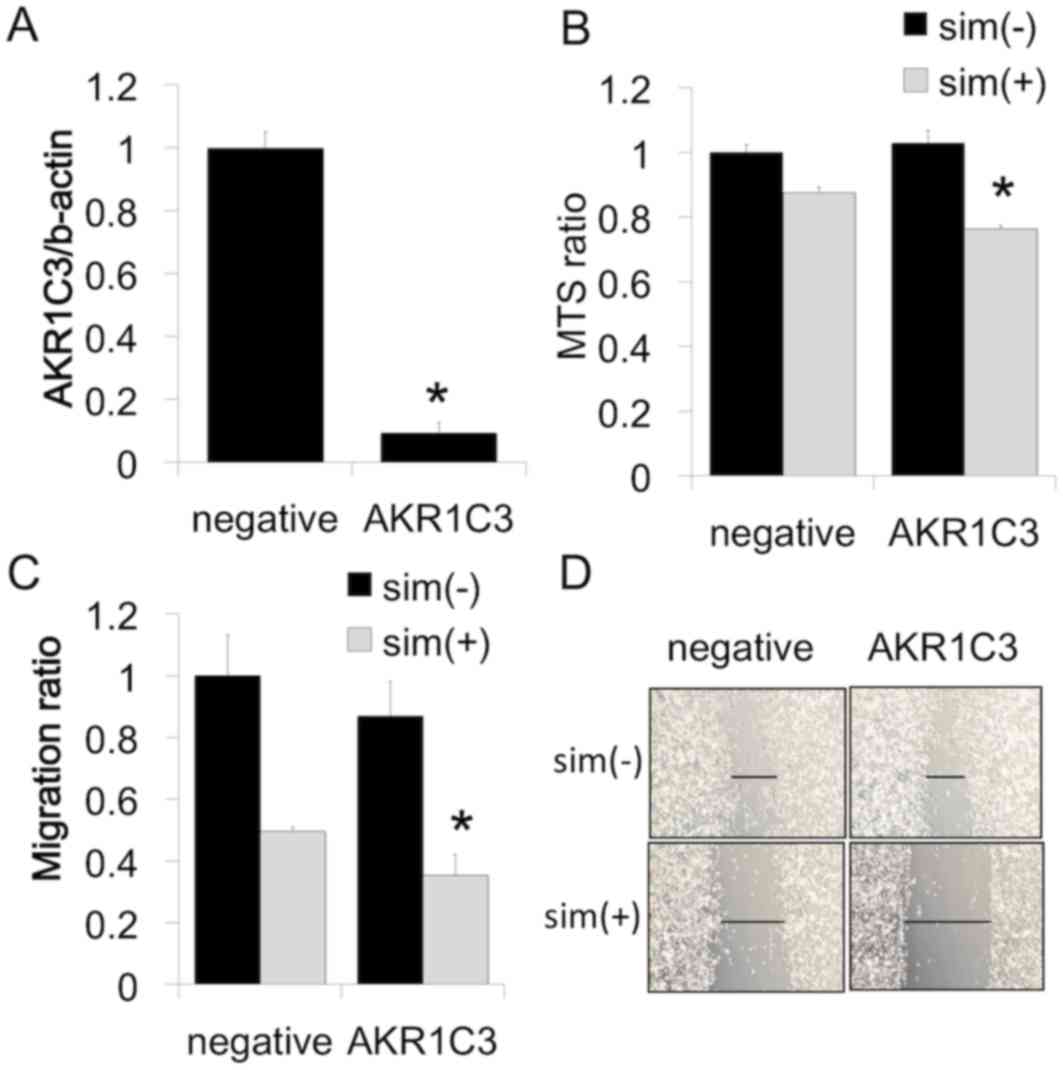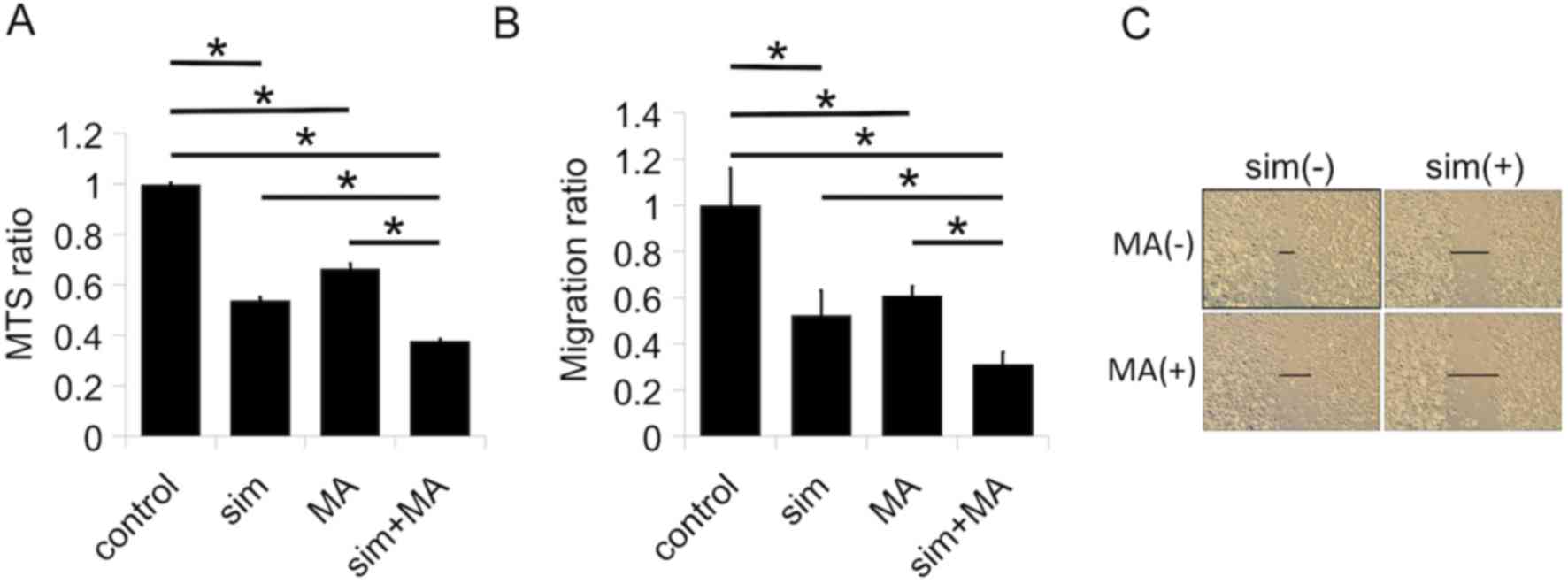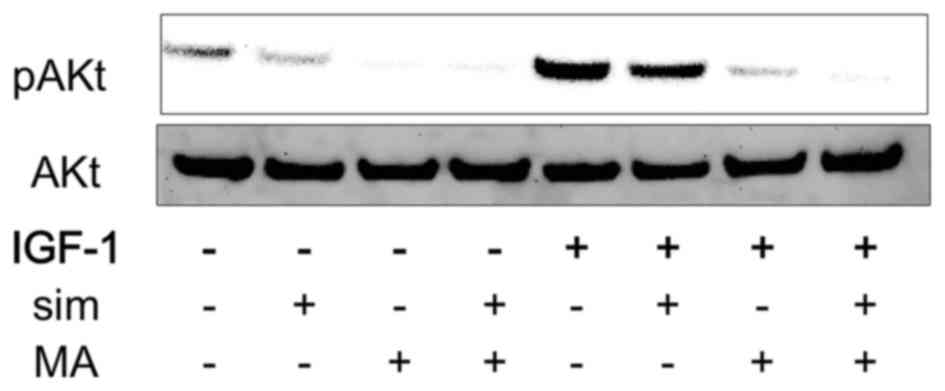|
1
|
Zhong S, Zhang X, Chen L, Ma T, Tang J and
Zhao J: Statin use and mortality in cancer patients: Systematic
review and meta-analysis of observational studies. Cancer Treat
Rev. 41:554–567. 2015. View Article : Google Scholar : PubMed/NCBI
|
|
2
|
Bansal D, Undela K, D'Cruz S and Schifano
F: Statin use and risk of prostate cancer: A meta-analysis of
observational studies. PLoS One. 7:e466912012. View Article : Google Scholar : PubMed/NCBI
|
|
3
|
Platz EA, Tangen CM, Goodman PJ, Till C,
Parnes HL, Figg WD, Albanes D, Neuhouser ML, Klein EA, Lucia MS, et
al: Statin drug use is not associated with prostate cancer risk in
men who are regularly screened. J Urol. 192:379–384. 2014.
View Article : Google Scholar : PubMed/NCBI
|
|
4
|
Sekine Y, Furuya Y, Nishii M, Koike H,
Matsui H and Suzuki K: Simvastatin inhibits the proliferation of
human prostate cancer PC-3 cells via down-regulation of the
insulin-like growth factor 1 receptor. Biochem Biophys Res Commun.
372:356–361. 2008. View Article : Google Scholar : PubMed/NCBI
|
|
5
|
Miyazawa Y, Sekine Y, Kato H, Furuya Y,
Koike H and Suzuki K: Simvastatin Up-regulates annexin A10 that can
inhibit the proliferation, migration, and invasion in
androgen-independent human prostate cancer cells. Prostate.
77:337–349. 2017. View Article : Google Scholar : PubMed/NCBI
|
|
6
|
Furuya Y, Sekine Y, Kato H, Miyazawa Y,
Koike H and Suzuki K: Low-density lipoprotein receptors play an
important role in the inhibition of prostate cancer cell
proliferation by statins. Prostate Int. 4:56–60. 2016. View Article : Google Scholar : PubMed/NCBI
|
|
7
|
Sobel RE and Sadar MD: Cell lines used in
prostate cancer research: A compendium of old and new lines-part 1.
J Urol. 173:342–359. 2005. View Article : Google Scholar : PubMed/NCBI
|
|
8
|
Suzuki K, Koike H, Matsui H, Ono Y, Hasumi
M, Nakazato H, Okugi H, Sekine Y, Oki K, Ito K, et al: Genistein, a
soy isoflavone, induces glutathione peroxidase in the human
prostate cancer cell lines LNCaP and PC-3. Int J Cancer.
99:846–852. 2002. View Article : Google Scholar : PubMed/NCBI
|
|
9
|
Dozmorov MG, Azzarello JT, Wren JD, Fung
KM, Yang Q, Davis JS, Hurst RE, Culkin DJ, Penning TM and Lin HK:
Elevated AKR1C3 expression promotes prostate cancer cell survival
and prostate cell-mediated endothelial cell tube formation:
Implications for prostate cancer progression. BMC Cancer.
10:6722010. View Article : Google Scholar : PubMed/NCBI
|
|
10
|
Flanagan JU, Yosaatmadja Y, Teague RM,
Chai MZ, Turnbull AP and Squire CJ: Crystal structures of three
classes of non-steroidal anti-inflammatory drugs in complex with
aldo-keto reductase 1C3. PLoS One. 8:e439652012. View Article : Google Scholar
|
|
11
|
Zhuang L, Kim J, Adam RM, Solomon KR and
Freeman MR: Cholesterol targeting alters lipid raft composition and
cell survival in prostate cancer cells and xenografts. J Clin
Invest. 115:959–968. 2005. View Article : Google Scholar : PubMed/NCBI
|
|
12
|
Sivaprasad U, Abbas Tand and Dutta V:
Differential efficacy of 3-hydroxy-3-methlyglutaryl CoA reductase
inhibitors on the cell cycle of prostate cancer cells. Mol Cancer
Ther. 5:2310–2316. 2006. View Article : Google Scholar : PubMed/NCBI
|
|
13
|
Cai C, Chen S, Ng P, Bubley GJ, Nelson PS,
Mostaghel EA, Marck B, Matsumoto AM, Simon NI, Wang H, et al:
Intratumoral de novo steroid synthesis activates androgen receptor
in castration-resistant prostate cancer and is upregulated by
treatment with CYP17A1 inhibitors. Cancer Res. 71:6503–6513. 2011.
View Article : Google Scholar : PubMed/NCBI
|
|
14
|
Matsuura K, Shiraishi H, Hara A, Sato K,
Deyashiki Y, Ninomiya M and Sakai S: Identification of a principal
mRNA species for human 3alpha-hydroxysteroid dehydrogenase isoform
(AKR1C3) that exhibits high prostaglandin D2 11-ketoreductase
activity. J Biochem. 124:940–946. 1998. View Article : Google Scholar : PubMed/NCBI
|
|
15
|
Azzarello JT, Lin HK, Gherezghiher A,
Zakharov V, Yu Z, Kropp BP, Culkin DJ, Penning TM and Fung KM:
Expression of AKR1C3 in renal cell carcinoma, papillary urothelial
carcinoma, and Wilms' tumor. Int J Clin Exp Pathol. 3:147–155.
2009.PubMed/NCBI
|
|
16
|
Byrns MC, Duan L, Lee SH, Blair IA and
Penning TM: Aldo-keto reductase 1C3 expression in MCF-7 cells
reveals roles in steroid hormone and prostaglandin metabolism that
may explain its over-expression in breast cancer. J Steroid Biochem
Mol Biol. 118:177–187. 2010. View Article : Google Scholar : PubMed/NCBI
|
|
17
|
Nakamura Y, Suzuki T, Nakabayashi M, Endoh
M, Sakamoto K, Mikami Y, Moriya T, Ito A, Takahashi S, Yamada S, et
al: In situ androgen producing enzymes in human prostate cancer.
Endocr Relat Cancer. 12:101–107. 2005. View Article : Google Scholar : PubMed/NCBI
|
|
18
|
Stanbrough M, Bubley G, Ross K, Golub TR,
Rubin MA, Penning TM, Febbo PG and Balk SP: Increased expression of
genes converting adrenal androgens to testosterone in
androgen-independent prostate cancer. Cancer Res. 66:2815–2825.
2006. View Article : Google Scholar : PubMed/NCBI
|
|
19
|
Wako K, Kawasaki T, Yamana K, Suzuki K,
Jiang S, Umezu H, Nishiyama T, Takahashi K, Hamakubo T, Kodama T
and Naito M: Expression of androgen receptor through
androgen-converting enzymes is associated with biological
aggressiveness in prostate cancer. J Clin Pathol. 61:448–454. 2008.
View Article : Google Scholar : PubMed/NCBI
|
|
20
|
Byrns MC, Jin Y and Penning TM: Inhibitors
of type 5 17β-hydroxysteroid dehydrogenase (AKR1C3): Overview and
structural insights. J Steroid Biochem Mol Biol. 125:95–104. 2011.
View Article : Google Scholar : PubMed/NCBI
|
|
21
|
Kalgutkar AS, Crews BC, Rowlinson SW,
Marnett AB, Kozak KR, Remmel RP and Marnett LJ: Biochemically based
design of cyclooxygenase-2 (COX-2) inhibitors: Facile conversion of
nonsteroidal antiinflammatory drugs to potent and highly selective
COX-2 inhibitors. Proc Natl Acad Sci USA. 97:pp. 925–930. 2000;
View Article : Google Scholar : PubMed/NCBI
|
|
22
|
Ouellet M and Percival MD: Effect of
inhibitor time-dependency on selectivity towards cyclooxygenase
isoforms. Biochem J. 306:247–251. 1995. View Article : Google Scholar : PubMed/NCBI
|
|
23
|
Soriano-Hernández AD, Galvan-Salazar HR,
Montes-Galindo DA, Rodriguez-Hernandez A, Martinez-Martinez R,
Guzman-Esquivel J, Valdez-Velazquez LL, Baltazar-Rodriguez LM,
Espinoza-Gómez F, Rojas-Martinez A, et al: Antitumor effect of
meclofenamic acid on human androgen-independent prostate cancer: A
preclinical evaluation. Int Urol Nephrol. 44:471–477. 2012.
View Article : Google Scholar : PubMed/NCBI
|
|
24
|
Zheng X, Cui XX, Avila GE, Huang MT, Liu
Y, Patel J, Kong AN, Paulino R, Shih WJ, Lin Y, et al: Atorvastatin
and celecoxib inhibit prostate PC-3 tumors in immunodeficient mice.
Clin Cancer Res. 13:5480–5487. 2007. View Article : Google Scholar : PubMed/NCBI
|
|
25
|
Wang H, Cui XX, Goodin S, Ding N, Van
Doren J, Du Z, Huang MT, Liu Y, Cheng X, Dipaola RS, et al:
Inhibition of IL-6 expression in LNCaP prostate cancer cells by a
combination of atorvastatin and celecoxib. Oncol Rep. 31:835–841.
2014. View Article : Google Scholar : PubMed/NCBI
|
|
26
|
Fraser M, Berlin A, Bristow RG and van der
Kwast T: Genomic, pathological, and clinical heterogeneity as
drivers of personalized medicine in prostate cancer. Urol Oncol.
33:85–94. 2015. View Article : Google Scholar : PubMed/NCBI
|















